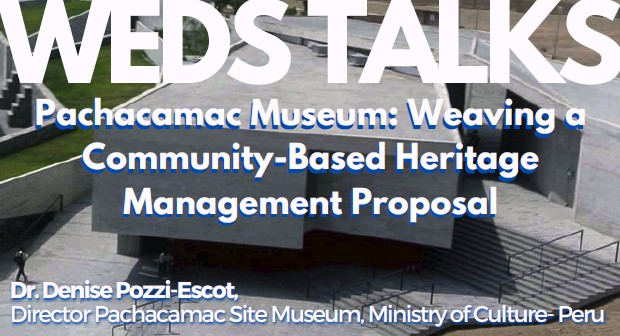Event: WEDS TALKS: Pachacamac Museum: Weaving a Community-Based Heritage Management Proposal
Event Details

ABSTRACT: The Pachacamac Museum is located within the archaeological sanctuary of the same name, south of Lima and near the Pacific coast, in an area now integrated into the urban fabric of the capital. This sanctuary was one of the most important ceremonial centers of pre-Hispanic Peru and represents a heritage space of immense historical, cultural, and symbolic significance.
In a context shaped by cultural diversity and the presence of neighboring communities of varied origins, the museum understands heritage as a common bond that strengthens collective identity and fosters social integration. Guided by the principles of social museology, the institution prioritizes educational initiatives and affective strategies that place the community as a central partner in processes of research, conservation, and dissemination.
Through this approach, the Pachacamac Museum aspires to consolidate its role not only as custodian of a site of universal value but also as a dynamic space for dialogue, inclusion, and the collective construction of memory. In doing so, it contributes to a broader reflection on the social responsibilities of museums in contemporary Peru.
BIO: Denise Pozzi-Escot studied archaeology at the Universidad Nacional Mayor de San Marcos in Lima, Peru, and received a postgraduate degree at Paris 1 Panthéon-Sorbonne. She excavated at the Conchopata site in Ayacucho, Peru, and in Chincha. She also excavated on Corsica and at Pincevent in Paris. She is a board member for ICOM Perú. and a visiting professor in the master’s programs on South American archaeology at the Universidad Nacional de Trujillo (Peru) and Université de Rennes 1 (France). She is responsible for several community education and outreach projects, including one that empowers local women to become entrepreneurs and use Pachacamac iconography in their products.


